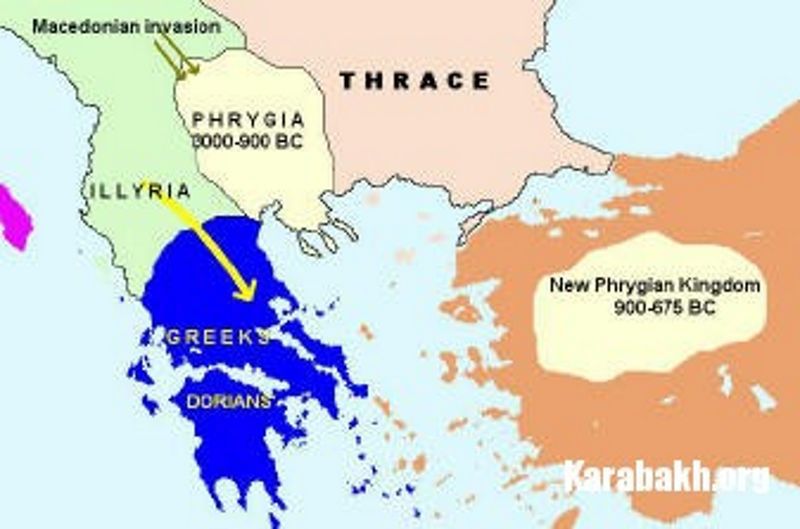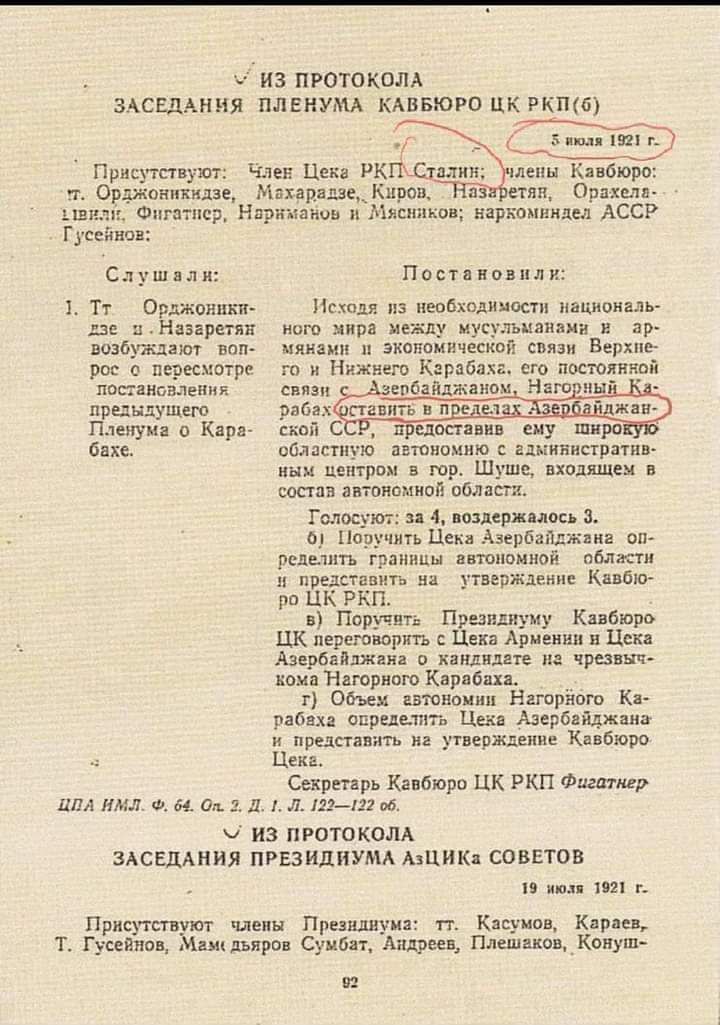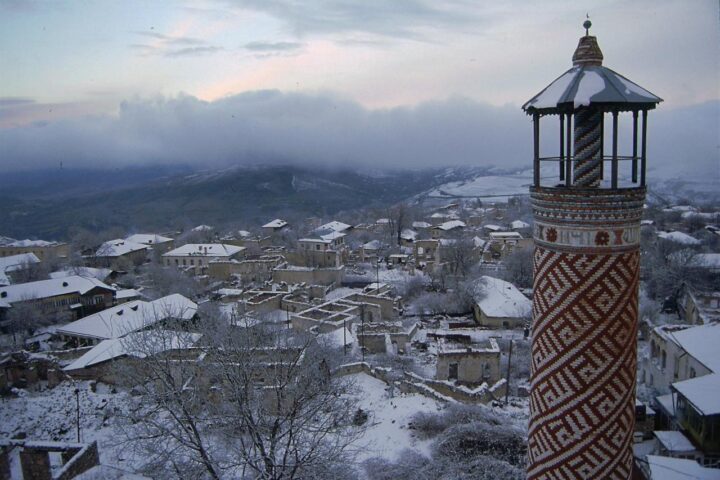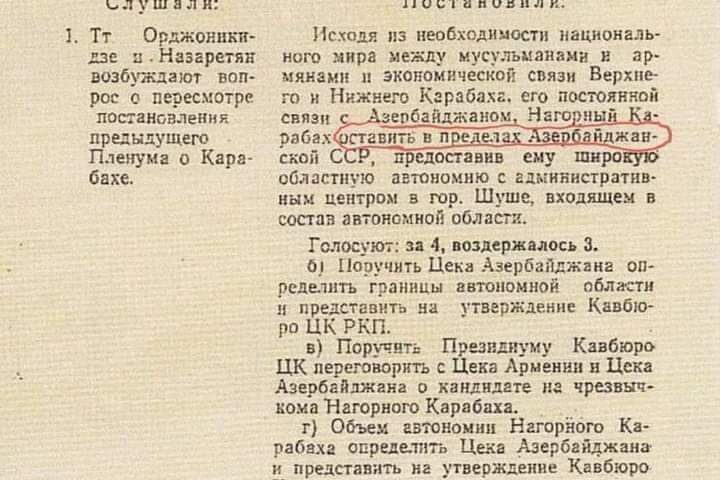News.Az interviews Azerbaijani historian Ismikhan Osmanli, an expert in the history of the South Caucasus.

You often repeat that Armenia has been gained by Armenians and it was not their homeland. What is your statement bound to?
The matter is that the world has many examples of migrated people and they do not conceal it and even take pride of this. For example, Magyars – present-day Hungarians call Hungary their acquired homeland, since they migrated here far from the East. However, Armenians are trying to conceal their repeated migration and falsify their history. But even Armenian scientists write not the history of Armenia as a territory but a history of the Armenian ethnos since there are no facts proving where their native lands is really located. According to ancient Greek sources, the current Armenians, descendants of frigo (Phrygians), migrated to the Balkans from Phrygia in Asia Minor and then to the Caucasus.
They were driven from there to the east by the tribes of Cimmerians. According to scientific research, the Cimmerians, who pursued Phrygians before them, came to the Caucasus in two ways: through the northern Caucasus and Georgia, and across present-day Turkey. Moving through Turkey, the Cimmerians, pressed forwards Phrygians from the Balkans up to Asia Minor. This was written by Armenist N.Adonts in the early 20th century in VIII century BC in Thrace, the Balkans, there appeared the Cimmerians, one of the “Sea Peoples”, by definition of the ancient Egyptian written records. Here they came into contact with the ancestors of today’s Armenians, whom they took away to the east – to Asia Minor.
According to the “father of history” Herodotus, Phrygia was near another historic area – Cappadocia. At the time of Herodotus, the ancestors of the Armenians lived up to the Euphrates, the river that divided, according to Herodotus, the Armenians from Cilicia. Herodotus stated that Armenians are the descendants of the Phrygians.
Scholars are unanimous in their opinion that Armenians are alien peoples in Asia Minor and the Caucasus. In the XIX century Russian expert on Caucasus I. Chopin said that “Armenians are aliens. They are descendants of Phrygians and Ionians who came to the northern valleys of Anatolian mountains”. The famous Armenian scholar M. Abegyan wrote, “it is supposed that the ancestors of the Armenians long before our era lived in Europe close to the ancestors of the Greeks and Thracians, whence they crossed to Asia Minor. At the time of Herodotus in the V century BC it was clearly understood that Armenians came to their country from the west”. The list goes on.
Are there definite proofs of migration of Cimmerians to Asia Minor and that they followed the Phrygian tribes?
I have to remind that Armenian city Gyumri is a Cimmerian toponym, which comes from the word ‘cimmer’ who settled here, while Armenians settled around Tigris and Euphrates – in Syria and Mesopotamia.
So why are they called ‘Phryges’, ‘Hayes’, ‘Armenians’?
As we said above, in ancient times Armenians were often called Phrygians by the place of their arrival-Phrygia in the Balkans. Since that Armenians have preserved this name: for example, the residents of the center of present day Republic of Armenia: Azerbaijanis (currently banished from there) and Armenians, call Armenians of Gyumri ‘Phrygian Armenians’. This was the name the neighbors of Armenians gave then in ancient times. The etymology of the word ‘Phryngian’ is not known, but it has been clearly defined that it is not Armenian. In Armenian language, there is no phoneme ‘ph’ at the beginning of words in Armenian and Armenians cannot pronounce such words, replacing ‘ph’ with ‘p’.
The Hayes tribes were called Armenians by Cimmerians who drove them away from the Balkans. Cimmerians called the ancestors of Armenians-Phrygians ‘ermeni’ and from this name as ‘armani’, ‘Armenians’ fixed and spread in other peoples.
As we know, Armenians call themselves Hayes?
Armenians call themselves Hayes, because they were allegedly the ancestors of mythical Heyk. But it is also their myth. The name of the country Hayas-Azzi was found in Asia Minor, in the upper Euphrates in ancient written sources . Armenians immediately started to call it their homeland, though earlier they did not know about Hayas-Azzi. Here, Armenian scientist Kapantsian wrote a book called ‘Hayas-craddle of Armenians’. However, the scientists who were dealing with ancient history of the East denied and criticized Kapantsian for his bias and proved that there is no topoformant ‘asa’ in Armenian, which means Hayas is not of Armenian origin.
From where did Armenians come to South Caucasus and Armenia?
As I have indicated above, the Armenians are alien in Armenia and the present-day Armenia is not their historical homeland. Caucasus-Armenia is acquired homeland of Armenians. Researches by world scientists have long ago proved that the Armenian – Thracian tribes migrated to the east, to Asia Minor, between the rivers Tigris and Euphrates under the pressure of Cimmerians. From Asia Minor, they came to Armenia and Karabakh. They are not natives of Asia Minor and the Caucasus. In addition to historical sources, the prove that Armenians are not autochthonous is the so-called Armenian illness. The illness-victims have a high temperature which causes an unusual discomfort, which is called “Armenian periodic disease” or “Mediterranean”. The disease occurs predominantly among the representatives of peoples whose ancestors lived in the Mediterranean basin, especially among Armenians, Jews and Arabs.
Then what do you think about the further destiny of the Armenian people, who have again become part of the geopolitical game of their close and remote empires and got enemies almost among all neighbor states?
Armenians were also described in the Caucasus as ‘standing on ice’ that is they are slippery in their actions and tend to betray, change their position and place of residence. You see, in all conflicts and wars between regional empires, Armenians have been playing a very active and often unpleasant role, becoming a weapon in the hands of the hostile empires. When one of the empires won, it left Armenians to the mercy of face, one-on-one with their problems, gained in enmity with neighbor peoples. As a result, Armenians suffered from the intrigues of their leaders, who have turned them into a token coin in the policy of bigger states.
In period of the USSR no one could turn Georgians, Azerbaijanis and Dagestanis into enemies, because they are native peoples in the region, their old wisdom and ancient laws of good neighborliness do not allow them to yield to external intrigues. As for Armenians, they, like earlier in history, were set against Georgian and Azerbaijani people. History shows that Armenians are aggressive, they cannot live calmly and do not allow neighbors to live in tranquility.
Armenians appeared in the Caucasus including in Azerbaijan and Nagorno Karabakh in mass quantity in the 19th-early 20th century when Russian tricolor was set over the region. With the USSR collapse, the ancestors of Armenian separatists who migrated from Turkey and Iran declared the secession of the ancient Azerbaijani land Karabakh from Azerbaijan. This became one of the reasons of worsening of sociopolitical situation in Azerbaijan in the 1980-1990’s.
Naturally, all these problems caused the most negative implications for Armenia. The republic saw worsening of problems of unemployment, which prompted the outflow of Armenian young people to other countries, drop in birth rates and life span.
The situation was even more disastrous in the political life of Armenia. The next round of resignation in the supreme elite started. Those Armenian politicians who leave the posts abandon the country. They do not care about the destiny of the Armenian people. The intriguer-politicians launched the Karabakh conflict and like many ordinary Armenians say ‘gave a yoke of Karabakh to their people”.
Do you think Armenian intellectuals understand the situation and can change anything in the life of their people?
During international events I have the opportunity to communicate with Armenian scientists and intellectuals. I have to note that most of them sympathize with their people and fear repetition of the tragic events and a new wave of the mass migration of Armenians this time from the South Caucasus especially that over a half of the Armenian population left Armenia and occupied Karabakh. Most Armenian scientists note that they lost Karabakh when they started the conflict with Azerbaijan in period of the USSR collapse. They realize that they have lost much because they are not able to use the welfare and resources of Azerbaijan, which played a key role in the flourishing of the Armenian people in the South Caucasus.
During the meetings Armenians say that the trips via the regions of Armenia, in particular Zangazur, Goycha, Masis, once settled by Azerbaijanis, as well as the occupied Azerbaijani regions strikes fear and leaves a depressing impression on one’s mind. As they told me repeatedly, when passing though Zangazur, and then Lachin and getting to the Azerbaijani occupied lands, they can see devastated lands, settlements which appear like ghosts on the road. The road from Armenia to Karabakh strikes fear because no one lives there and the spirit of devastation oppresses anyone who sees it. Except for Khankandi and a little in Shusha, the constructive works are not conducted anywhere in the occupied lands and according to Armenians there are several Azerbaijani villages in Karabakh where they do not go because the fear the appearance of Azerbaijanis there, since the latter often visit their native lands.
Does it mean that the Armenian people are doomed to constant migration from one region into another?
I have to note that Armenians will always tend to migrating to new places because they associate the notion ’Homeland’ not with the territories but the myth of ‘Great Armenia’. For Armenians, their Homeland and a state has always been the Armenian Church which calls any favorable place for residence ‘Armenia’. For the reason of the Caucasus annexation to the Russian empire in the 19th century, over a million of Armenians moved from their ‘Homeland’ in Turkey, Persia and Middle East to this region. No people in the world, except Armenians, migrate on a goodwill basis from their homeland, because any people who know their homeland will never leave the lands and graves of their ancestors.
Now the Armenian people in the South Caucasus are going through the most tragic and hard period in their history. In the Soviet times Armenians could exist stably and develop through subsidies from the ally republics and the Center, while now these channels are lost and Armenia is at odds with three of the four neighbors. Ordinary Armenian people who are now leaving the region always suffer from this unwise policy of Armenian leaders. If foreign investments and aid to Armenia are ceased, not a single Armenian will be left there or it will become a country of Amazons, because the able-bodied men leave the country first of all. Rich and influential families usually leave Armenia first of all. So what do the ordinary people have to do?






